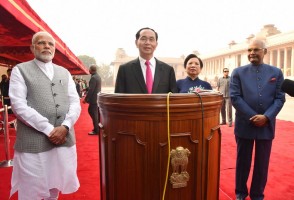
Assocham finds changing the fiscal year, ‘a huge avoidable disruption’
The Dollar Business Bureau |
Last week the government set up a four-member committee to examine, the feasibility and desirability of changing into a new financial or fiscal year from the present April-March.
The government committee headed by former Chief Economic Advisor, Shankar Acharya, former Cabinet Secretary K.M. Chandrasekhar, Senior fellow, Centre for Policy Research, Rajiv Kumar and former Tamilnadu Finance Secretary P.V.Rajaraman, was asked to submit its report on their deliberations by the year end of 2016.
Reacting to the move taken by the government, Assocham said, “Any move to change India’s financial year from April-March to any other permutation and commutation would serve no purpose but cause a huge avoidable disruption at a big cost for the country’s trade and industry.”
D.S. Rawat, Assocham Secretary General, minced no words in saying the move was an unnecessary exercise causing huge expenditure in crores of rupees as the change would bring about a change in book-keeping, change in accounting software, taxation systems, HR practices, causing confusion as the practice of April-March has been in practice for well over hundred years!
Speaking to the media Rawat said, “In any case, different countries follow different financial years and there is no standard accounting practice for the world. So, change to any other calendar would not result into India aligning itself with the world. Besides, even within the domestic economy, there is no tangible reason for the unnecessary change for which the government has set up a committee to deliberate whether there is a need for a shift."
The government on its part put forward the argument that the current system of April-March financial year does not allow budget makers to have a proper assessment of the monsoon. The chamber did not agree to the same saying that the contribution of the agriculture sector to the country’s GDP was less than 15%, and even if the FY is changed to January-Dec as proposed by the government, and the yearly budget is presented in October, the figures of the monsoon would be clear only for that running year and not for the next, as budgeting is also done for the coming year based on the weather forecast.
Comparing the move to changing the fiscal year to changing the Indian driving system from right to left hand driving, Assocham said,
“The move to change the fiscal year is akin to a situation where the government in its own wisdom decides to change the Indian driving system from right hand driving to the left hand without realizing that it would require changing the entire road and street infrastructure along with changes in the design of the automobiles.
“Besides, it is the mind-set issue. These systems have grown over the psyche of the citizens. The fiscal year is even made co-terminus with the academic years in schools and many universities…..Suddenly, we must not bring in such changes which have no apparent advantage,” ASSOCHAM pointed out.
Terming the move an ill-advised one, the chamber said that the feedback from its members suggest it is an ill-advised one and would in no way lead any improvement in the ease of doing business, but create hurdles and unnecessary delays in bureaucratic processes which at this point would be endemic to India.





 to success.
to success.